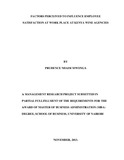| dc.description.abstract | The aspect of employee satisfaction has now more than ever become more critical
because of globalization of the workplace, incidents of organizations undertaking
restructuring measures to maintain a leaner workforce and the need to build customer
communities in a networked world. This study was motivated by the acknowledgment
that retention of suitable levels of employee satisfaction and getting to know how to
manage the factors that influence employee satisfaction leads to improved and increased
organizational performance. For this reason, management has embraced the concept of
employee motivation and satisfaction so as to retain the long term relationship with the
employees in a cordial environment. The study was based on the fact that overall success
of an organization depends on the commitment and engagement of the employed by
understanding and promoting the factors that influence employees’ performance and
adopting practices that improve flexibility of work schedules and quality of working life.
The data for this study was collected using questionnaires from a sample of seventy
employees representing about twenty nine percent of total employees in KWAL. The data
was analyzed using descriptive measures, percentages and frequency distribution tables.
From the research findings, relationships were found to exist between the survey
independent variables with the dependent variables. Precisely the research established
that factors that influence employee satisfaction include: Recognition, employee
participation in management decisions; feedback, goals and on-job training. Besides,
relationships were found to exist between the variables under study and the identified
indicators per variable. The respective indicators of each of these variables were as
follows: Recognition – Individual value, Performance, Gender equitability, Promotion,
and competitive terms. Management – Teamwork, Decision making, Leadership skills,
and Supervisors – subordinates relationships. Feedback – communication and
Performance feedback. Goal indicated that the independent variables (i.e personal
characteristics, job and role-related factors, professional commitment and HR practices)
were stronger predictors of organizational commitment, job satisfaction and turnover
intentions in professional employees than the technical employees. It was also noted that
age, education, professional commitment, role overload, supervisory support, job
security, promotional opportunities, distributive justice and participation in decision
making were the most important predictors of employee satisfaction among employee.
These results are significant for theory, policy and practice. Out of the insights of
findings of the study, it is recommended that both Line and HR managers should try to
understand factors and establish work-related practices that enhance the most ‘desirable’
component of employee commitment so as to promote employee performance and the
organization as a whole. | en |

